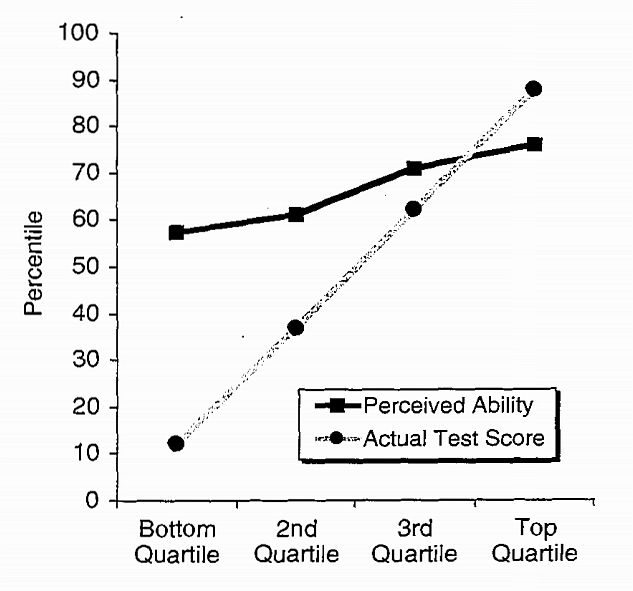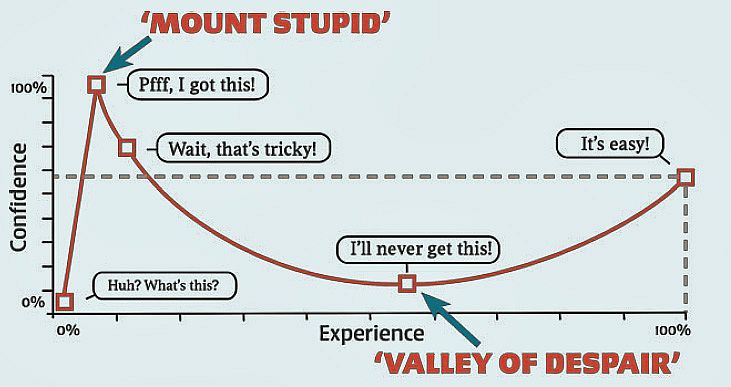Bijna iedereen kan zich een tijd herinneren waarin ze iemand zijn tegengekomen die onbeschaamd verklaarde dat hij gelijk had en de tegenstrijdige mening van alle anderen ongeïnformeerd en gewoon verkeerd was. Soms lijkt het misschien duidelijk dat deze persoon niet weet waar hij het over heeft, maar hij lijkt zich gelukkig niet bewust te zijn van zijn onwetendheid.
In de psychologie staat dit fenomeen bekend als het Dunning-Kruger-effect, toepasselijk genoemd naar de twee sociale onderzoekspsychologen, Dr. David Dunning en Dr. Justin Kruger, die het voor het eerst beschreven in hun artikel dat gepubliceerd werd in het Journal of Personality and Social Psychology, deel 77 in 1999.
Dunning en Kruger stellen dat, wanneer mensen incompetent zijn in de strategieën die ze gebruiken om succes en tevredenheid te bereiken, ze een dubbele last hebben: niet alleen trekken ze verkeerde conclusies en maken ze ongelukkige keuzes, maar hun incompetentie berooft hen van het vermogen om het te realiseren. In plaats daarvan krijgen ze de verkeerde indruk dat ze het prima doen.
Zoals Miller (1993) opmerkte: “Het is een van de essentiële kenmerken van dergelijke incompetentie dat de persoon die zo getroffen is, niet in staat is te weten dat hij incompetent is. Het hebben van dergelijke kennis zou al een groot deel van het probleem verhelpen.”
En zoals Charles Darwin (1871) meer dan een eeuw geleden wijselijk opmerkte: “onwetendheid wekt vaker vertrouwen dan kennis“.

In wezen stellen Dunning en Kruger dat de vaardigheden die competentie in een bepaald domein voortbrengen, vaak dezelfde vaardigheden zijn die nodig zijn om competentie in dat domein te evalueren – die van jezelf of van iemand anders.
Hierdoor missen incompetente individuen wat cognitief psychologen ook wel metacognitie, metageheugen, metabegrip of zelfcontrolevaardigheden noemen. Deze termen verwijzen naar het vermogen om te weten hoe goed men presteert, wanneer men waarschijnlijk nauwkeurig zal zijn in het oordeel en wanneer men waarschijnlijk een fout zal maken.
Denk bijvoorbeeld aan het vermogen om grammaticaal correct Engels te schrijven. De vaardigheden die iemand in staat stellen een grammaticale zin te construeren, zijn dezelfde vaardigheden die nodig zijn om een grammaticale zin te herkennen, en zijn dus dezelfde vaardigheden die nodig zijn om te bepalen of er een grammaticale fout is gemaakt.
Onvolmaakte zelfevaluatie
Dunning en Kruger richten zich op de metacognitieve vaardigheden van incompetente personen om gedeeltelijk te verklaren waarom mensen zo onvolmaakt lijken te zijn in het beoordelen van zichzelf en hun capaciteiten. Misschien wel de beste illustratie van deze tendens is het “bovengemiddelde effect“, of de neiging van de gemiddelde persoon om te geloven dat hij of zij bovengemiddeld is, een resultaat dat de logica van elke beschrijvende statistiek tart.
Bijvoorbeeld:
- middelbare scholieren hebben de neiging om zichzelf te zien als meer bekwaam in leiderschap, in de omgang met anderen en in schriftelijke expressie dan hun leeftijdsgenoten,
- bedrijfsmanagers zien zichzelf als meer bekwaam dan de typische manager,
- voetballers zien zichzelf als slimmer in “voetbalgevoel” dan hun teamgenoten.
Imperfect self-assessment
For example:

Competentie en metacognitieve vaardigheden
Verschillende onderzoeken komen overeen met het idee dat incompetente individuen de metacognitieve vaardigheden missen die nodig zijn voor een nauwkeurige zelfbeoordeling. In het schaken zijn beginners minder gekalibreerd dan experts over hoe vaak ze een bepaalde schaakbordstelling moeten zien voordat ze deze correct kunnen reproduceren. In de natuurkunde zijn beginners minder nauwkeurig dan experts in het beoordelen van de moeilijkheidsgraad van natuurkundige problemen.
Een paar voorbeelden:
- Sociaal incompetente jongens zijn zich grotendeels niet bewust van hun gebrek aan sociale gratie (een soortgelijk resultaat werd gevonden bij studenten).
- Studenten die slecht scoren op toetsen, voorspellen minder nauwkeurig welke vragen ze goed zullen hebben dan studenten die het goed doen.
- Onervaren lezers zijn minder goed in staat om hun tekstbegrip te beoordelen dan meer bekwame lezers.
- Chauffeurs die betrokken zijn bij ongevallen of een rijexamen niet halen, voorspellen hun prestaties op een reactietest minder nauwkeurig dan meer bekwame en ervaren chauffeurs.

Waargenomen bekwaamheid als functie van daadwerkelijke testprestaties
Conclusie
Mensen hebben de neiging om te optimistische en verkeerd gekalibreerde opvattingen over zichzelf te hebben. Dunning en Kruger stellen dat degenen met beperkte kennis in een domein een dubbele last hebben: ze komen niet alleen tot verkeerde conclusies en maken betreurenswaardige fouten, maar hun incompetentie berooft hen van het vermogen om dat te realiseren.
Uit het vervolgonderzoek van Dunning bleek dat de slechtste presteerders het minst geneigd waren om kritiek te accepteren of interesse te tonen in zelfverbetering. Door op de feiten te wijzen, correcties aan te brengen of hen te vertellen dat ze ongelijk hebben, wordt het meestal nergens constructief.
Het verbeteren van iemands vaardigheden en het vergroten van zijn vermogen om feiten van fictie te onderscheiden, helpt hen om de grenzen van hun eigen kunnen te herkennen.
Ik heb ooit met een vrouw gewerkt die met het hele kantoor ruzie had dat de tekst van Feliz Navidad “feliz la-dee-da” was. We konden haar niet anders overtuigen. (Dr. Christine Bradstreet in een blog genaamd “Ik kwam oog in oog te staan met het Dunning Kruger-effect“)
We kunnen het gewoon weglachen als een dwaze gril als het een songtekst is, maar hoe zit het als het je chirurg, je baas, je piloot of je president is?
Het verklaart waarom mensen die niets van wetenschap afweten er zo zeker van kunnen zijn dat klimaatverandering niet bestaat. Het verklaart waarom meer dan 90% van de faculteit van de Universiteit van Nebraska zichzelf als bovengemiddeld beoordeelde. Het verklaart waarom we allemaal denken dat we betere chauffeurs zijn dan alle anderen.

Analyse van een recent gerelateerd onderzoek
In een recente studie onderzochten onderzoekers van de Zayed University in Abu Dhabi en het Albright College in Reading, Pennsylvania, hoe het Dunning-Kruger-effect, of de overschatting door mensen van hun vaardigheden, het intuïtieve denken kan beïnvloeden.
De term ‘intuïtie‘ is niet universeel gedefinieerd, met verschillende disciplines die het woord op verschillende manieren gebruiken. Over het algemeen heeft intuïtie in de psychologie betrekking op het gebruik van heuristische aanwijzingen of patroonherkenning om beslissingen te nemen of kennis te bezitten zonder analytisch denken of ogenschijnlijk overleg.
Een schat aan onderzoek heeft aangetoond dat intuïtie een krachtige en wetenschappelijk onderbouwde vaardigheid is, die mensen kan helpen snellere en nauwkeurigere beslissingen te nemen. Dit aangeboren vermogen tot onbewuste wijsheid komt voort uit het feit dat de menselijke geest is geprogrammeerd voor patroonherkenning.
Cognitieve reflectietest (CRT)
Om het Dunning-Kruger-effect op intuïtief denken te testen, gebruikten onderzoekers de ‘cognitieve reflectietest‘ (CRT), ontwikkeld door Yale-professor dr. Shane Frederick.
De CRT wordt gebruikt om het vermogen van een persoon te meten om een onjuiste intuïtieve reactie op te heffen en analytisch te denken om een correct antwoord te vinden. Succes op de test hangt af van het vermogen en de bereidheid van een persoon om hun aanvankelijke intuïtieve reactie te overwinnen.
Een veel genoemd probleem op de CRT is de vraag: “Een bat en bal kosten in totaal $1,10. De knuppel kostte $ 1,00 meer dan de bal. Hoeveel kost de bal?” Het intuïtieve antwoord dat snel in je opkomt is 10 cent, wat niet klopt. Het juiste antwoord is 5 cent ($ 0,05 bal + $ 1,05 knuppel = $ 1,10 totaal). Om tot het juiste antwoord te komen, moet men hun aanvankelijke “onderbuikreactie” verwerpen en zich bezighouden met deliberatieve, analytische redenering.
CRT-studie
In het onderzoek werden 178 vrouwelijke niet-gegradueerde studenten van de Zayed University, Abu Dhabi, gevraagd om hun prestaties te evalueren na het voltooien van een cognitieve reflectietest met zeven vragen. Deelnemers werd ook gevraagd om een zelfrapportageonderzoek ‘geloof in intuïtie‘ in te vullen om hun vertrouwen in intuïtieve besluitvorming te meten.
Na analyse van de resultaten ontdekten de onderzoekers dat deelnemers met de meeste fouten op de CRT hun werkelijke prestaties in veel hogere mate miskalibreerden dan degenen die minder foute antwoorden hadden. “In het bijzonder, op een test die uit zeven punten bestond, overschatten laagpresteerders hun CRT-score met 4,26, die goed presteerders met slechts 1 verkeerd kalibreerden“, merkten onderzoekers op.
Ze concludeerden dat de resultaten suggereren dat laagpresteerders ofwel minder geneigd waren om analytisch te denken om hun intuïtieve reacties te verifiëren, of dat de output van analytische processen geen overtuigend bewijs leverde om hun intuïtieve reactie omver te werpen.
Onderzoekers ontdekten ook dat deelnemers die zichzelf als meer intuïtief beschouwden, degenen waren met de grootste discrepantie tussen geschatte en werkelijke scores op de CRT. Deze resultaten suggereren dat mensen die genieten van en vertrouwen hebben in intuïtie, minder snel herkennen wanneer ze een fout maken, waardoor ze geneigd zijn hun prestaties te overschatten.
Dubbele last
“Dit is een dubbele belasting die helaas heel gewoon is“, legt dr. Couchman uit. “Mensen die zichzelf als meer intuïtief beschouwen, merken waarschijnlijk op en herinneren zich de keren dat hun intuïtie werkte, en vergeten wanneer het onjuist was. Dat zorgt voor een tekort aan kennis, maar vergroot ook hun vertrouwen in het verkeerde proces. Beide problemen werken samen om het waarschijnlijker te maken dat ze in de toekomst fouten zullen maken.”
Remedie voor het Dunning Kruger-effect
Er is een remedie voor het effect, al bekend bij de Griekse filosoof Socrates:
“De enige echte wijsheid is te weten dat je niets weet.“
Socrates.